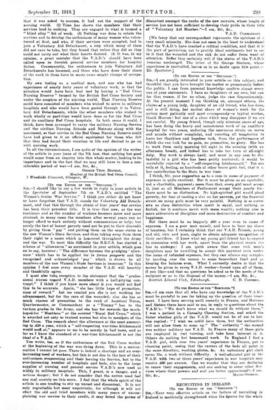[TO THE EDITOR OF THE " SPECTATOR.' 'I
SIK,—i should like to say a few words in reply to your article in the Spectator of September 7th on V.A.D.'s entitled "The Woman's Senior War Service." I think you either do not know or have forgotten that V.A.D. stands for Voluntary Aid Detach- ment, and that this through the strain of four years' war service has been their proudest title. It is true that now, as the war continues and as the number of workers becomes more and more strained, in many cases the members after several years can no longer afford to work entirely without remuneration or help; but surely the feet of honest poverty need not be put to their discredit by giving them " pay " and putting them on the same status as the new Women's State Services, and thus taking away from them their right to a name which is honoured throughout the Army and the war. To meet this diffmulty the B.R.C.S. has started a scheme of "allowances" as mentioned in your article, which goes on to say, however : "The difference between the grudging ' allow- ance ' which has to be applied for in forma paupsris and the recognised anti acknowledged 'pay' which is drawn by all members of the new Women's Stake Services is immense." In this opinion I feel sure every member of the V.A.D. will heartily and thankfully agree.
I must also take, exception to the statement that the "profes- sional nurses regard V.A.D. members with a half-pitying con- tempt." I think if you knew more about it you would not find this to be accurate. Again. "she has little hope of promotion, none of reward." Let me remind you she is not working for advancement, but for the care of the wounded; also she has as much chance of promotion to the rank of Assistant Nurse, Quartermaster, or Commandant as a "Tommy" has to the various gradeain the Army, and she has for rewards the much- hoped-for Mentions" or the coveted "'Royal Red Cross," whioh is awarded not only to trained nurses but also to members of the Red Cross. The remark about the allowance at the most amount- ing to ..e20 a year, which a "self-respecting war-time kitchenmaid would scoff at," appears to me to be merely in bad taste, and as far as I know the standard of a war-time kitchenmaid is not the ideal of a V.AD.
You write, too, as if the enthusiasm of the Red Cross worker at the beginning-of the war was dying down. This is a miscon- ception I cannot let pass. There is indeed a shortage and an ever- increasingsmed of workers, but this is not due to the fact of their enthusiasm evaporating and their leaving the Service, but to the ever-increasing number of hospitals and beds, also to the large supplies of nursing and general service V.A.D.'s now used so widely in military hospitals. This, I grant, is a danger, and a serious danger; but I do not consider that the nation need feel any real anxiety on this score. I feel that the whole spirit of the article is OM tending to stir up unrest and discontent. It is not only regrettable but most unpatriotic, for although it will not affect the old and tried members with many years of uncom- plaining war service to their credit, it may breed the germs of discontent amongst the ranks of the new recruits, whose length of service has not been sufficient to develop their pride in their title of "Voluntary Aid Member,"—! am, Sir, &c., V.A.D. COMKANDA NT .
[We fancy that our correspondent represents the opinions of a very small minority. She does not seem in the least to understand that the V.A.D.'s have reached a critical condition, and that it is the part of patriotism not to gratify ideal sentiments hut to see to it that the wounded and the sick do not suffer from want of attention. Suffer they certainly will if the status of the V.A.D.'s remains unchanged. The letter of Sir George Beatson, whose experience is unrivalled, leaves us in no doubt upon this point.— En. Spectator.]


































 Previous page
Previous page